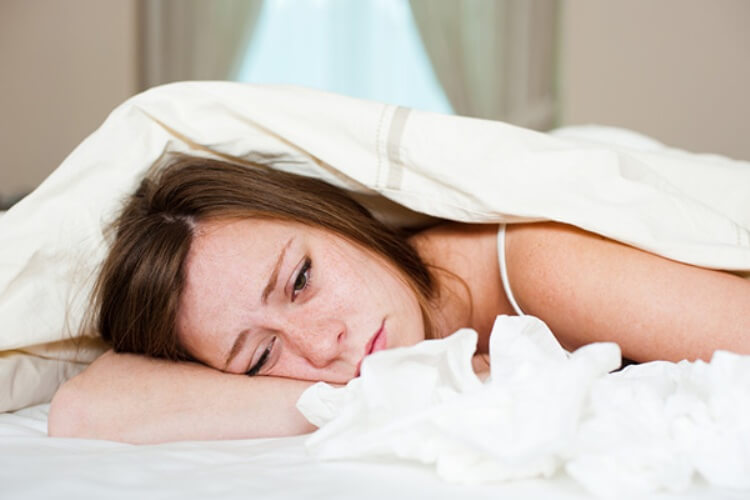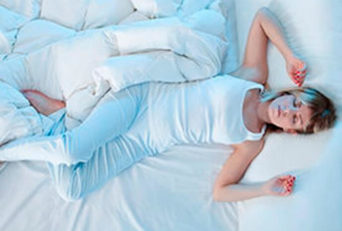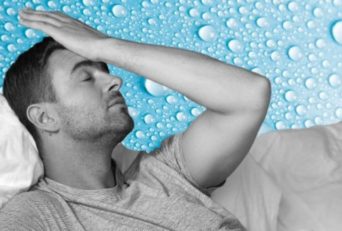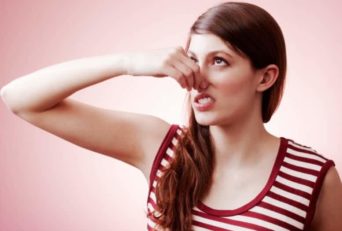Night sweats may seem to be a minor issue but sometimes it may prove to a dangerous symptom for some underlying serious health problems.
Night sweats in women under 40 is a very common symptom during premenstrual syndrome, pregnancy and menopause. There may be many other reasons for such a cause. In medical terms, when a person suffers from excessive perspiration the condition is known as hyperhidrosis.
Table of Contents
What Is Night Sweating?
Night sweats are also called sleep hyperhidrosis; this causes excessive sweating during sleep. An individual may or may not experience excessive perspiration while awake. While night sweats might be relatively harmless, it can also be a symptom or sign of a serious underlying disease.
It is important to distinguish night sweats due to medical causes from those that occur simply because of the sleep environment if it is too warm, either because the bedroom is hot due to certain conditions or because there are too many warm covers on the bed.
Night sweats caused by any medical condition can be defined as “excessive or severe perspiration at night which is not related to the environment. Some of the underlying medical conditions that cause these severe night sweats can be life-threatening and should be investigated or diagnosed by a medical practitioner.
Causes Of Night Sweats
If your bedroom is hot due to certain conditions or you are wearing too many bedclothes or warm fabric garments, you may sweat during sleep, which is normal. But if this is not the case and still you tend to sweat at night then probably there are other causes you need to look at. Some very common causes include:
- Drinking alcohol
- Consuming products with caffeine
- Consumption of spicy foods
- Being inside a hot room
- Feeling very stressed or anxious
- Wearing tight clothes
- Smoking or getting exposed to cigarette smoke
Apart from this there may be other serious causes related to night sweating which includes-
1. Pregnancy
Pregnancy can also cause night sweats in women below 40. During pregnancy, there is occurrence of many hormonal changes which may cause night sweat in women. Some women also experience night sweats after pregnancy.
2. Cancer
Night sweats may be an early symptom of cancer. The most common type of cancer associated with night sweats is lymphoma. However, the people who have an undiagnosed cancer , have other symptoms as well, such as unexplained weight loss and fevers.
3. Menopause
Night sweating may be a symptom of menopause. This is a very common cause of night sweats in women below 40.
4. Medications
Certain medicine side effects can lead to night sweats. Antidepressant medications are a common type of drug that may be a cause of night sweat. 8% to 22% of people taking antidepressant drugs have experienced night sweats.
Some psychiatric drugs have also been associated with night sweats, such as aspirin and acetaminophen. These can sometimes lead to sweating. Many other drugs can also cause night sweats or flushing.
5. Hormonal Changes Or Disorder
Sweating can be seen with several hormone disorders, like pheochromocytoma, carcinoid syndrome, and hyperthyroidism.
6. Neurological Conditions
The neurologic conditions which include autonomic dysreflexia, posttraumatic syringomyelia, stroke, and autonomic neuropathy causes increased sweating and may also lead to night sweats.
7. Infections
Infections such as tonsillitis, tuberculosis and AIDS (HIV) virus can also cause night sweats in women under 40. Endocarditis that affects the heart valves, appendicitis and osteomyelitis infection in the bones is one of the causes of night sweating.
8. Hypogycemia
One of the causes of sweating can be low blood sugar. People taking insulin or oral diabetes medicines may have hypoglycemia at night that is also accompanied by sweating.
9. Idiopathic Hyperhidrosis
It a condition, in which the body chronically produces too much sweating without any identifiable medical cause.
Treatments/Home Remedies To Treat Night Sweats
i. Sleeping in a cool environment with light, breathable, non-synthetic night clothes and sheets.
ii. Appling a clinical strength antiperspirant to the body parts that are most sweaty like underarms, hands, feet, hairline, back, chest or groin.
iii. Avoid using a heavy comforter or over bundling.
iv. Avoid alcohol, caffeine, spicy foods; also avoid eating 2-3 hours before going to bed.
v. Sleeping in an air-conditioned room or under a fan.
vi. Practice relaxation breathing exercises before going to bed and after waking with a night sweat.
vii. Exercise daily.
viii. Try to maintain a normal weight.
ix. Drinking plenty of water during the day.
x. Medications known as anticholinergic agents may help reduce sweating. These should not be taken without the advice of a health care professional.
xi. Stop smoking, if you do.
xii. Sip into ice water at the start of a hot flash.
xiii. Include Vitamin B6-rich foods like wheat and cereal in your diet.
xiv. Consider eating Vitamin E-rich foods like almonds and sweet potato.
xv. Include foods rich in magnesium and calcium.
When To See A Doctor?
Visit a doctor if night sweats:
- When occurring on a regular basis.
- If it interrupts your sleep.
- If it is accompanied by fever or other symptoms, such as unexplained weight loss.
You May Also Like Reading:






